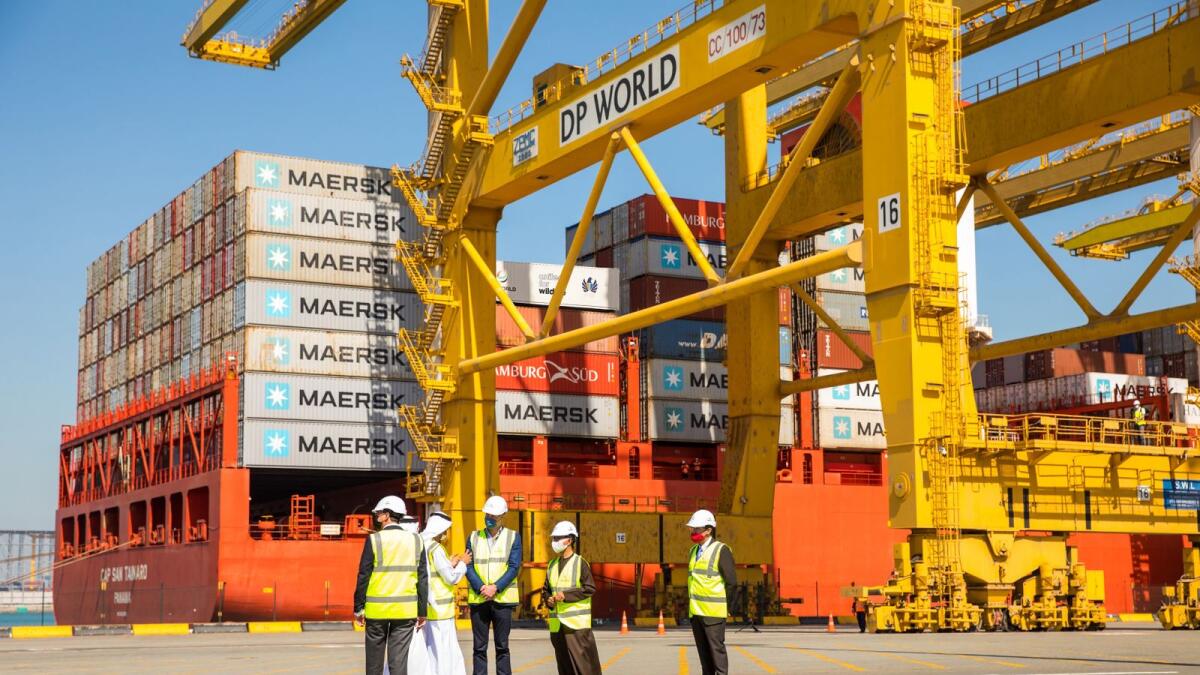DP World and Maersk enter long-term partnership at Jebel Ali
Pact to improve operational efficiencies, enhance customer service and collaborate on decarbonising

Jebel Ali Port is a leading international gateway port, ideally located to serve the East-West trade corridor connecting to 150 cities globally. - WAM
DP World has teamed up with global shipping services provider A.P. Moller-Maersk (Maersk), to improve operational efficiencies, enhance customer service and collaborate on decarbonising.
The long-term strategic partnership will provide support for Maersk's customers and implement new processes to improve quayside productivity, all leading to faster gate turnaround times at Jebel Ali Port and reduced bunker fuel consumption.
These are alongside visibility tools, which will allow Maersk's customers to benefit from real-time information relayed by DP World to plan their supply chains better and ultimately cut their carbon emissions. Maersk will deploy two of its solutions for customers moving their cargo through Jebel Ali -- Maersk Accelerate, a fast-tracking service through priority cargo handling, and Maersk Flex Hub, a cargo storage solution.
Jebel Ali Port is a leading international gateway port, ideally located to serve the East-West trade corridor connecting to 150 cities globally. Lowering carbon emissions is a common goal for both companies and increasingly demanded by customers, who sit at the heart of every decision the companies take. Maersk and DP World will continue collaborating to create new solutions, such as warehousing to drive better customer experience in the future.
Shahab Al Jassmi, Vice President – Ports & Terminals, DP World UAE said: "Jebel Ali's success has been built on progressive collaboration with partners such as Maersk, enabling us to combine our operational efficiencies and expertise to ensure we deliver the best end-to-end solutions to our customers. This synergy has allowed us to develop a successful ecosystem at Jebel Ali that continues to evolve and adapt to the dynamic markets we operate in. We will embark on this journey together to exceed our customers' expectations."
"This collaboration lets us offer solutions to help a key customer and reliable partner like Maersk to achieve their own sustainability goals. It sits alongside our own commitment to cutting our global CO2 emissions by nearly 700,000 tonnes over the next five years, in part by terminal vehicle electrification, sourcing renewable energy and increasing low carbon fuel use," Al Jassmi added.
"In our journey as an integrated logistics provider, we look at every opportunity that can create value for our customers. DP World's Jebel Ali Port has been a strategic partner to us for many years, and we have now extended our partnership with a clear focus on improving service delivery to our customers while reducing the carbon footprint through our operations together", said Mads Skov-Hansen, Head of Ocean Customer Logistics, Maersk West & Central Asia.
In January 2022, DP World entered a strategic partnership with the Mærsk Mc-Kinney Møller Centre for Zero Carbon Shipping, an independent, not-for-profit organisation launched in 2020 to undertake intensive research and development to find practical ways to decarbonise the global maritime trade industry.
Maersk itself aims to reach net zero emissions by 2040 across the entire business with new technologies, new vessels and green fuels. DP World has committed to becoming a carbon neutral enterprise by 2040 and net zero carbon enterprise by 2050.
DP World Group Chairman and CEO, Sultan Ahmed bin Sulayem announced plans in November to invest up to $500 million to cut CO2 emissions from its operations by nearly 700,000 tonnes over the next five years. The reduction in carbon emissions represents a 20 per cent cut from 2021 levels, through electrifying assets, investing in renewable power and exploring alternative fuels.




